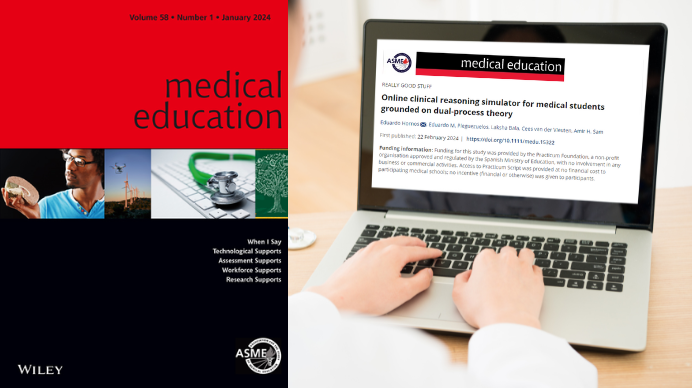
Madrid, 21 May 2024. Grounded in neurocognitive sciences, Practicum Script provides a valuable resource for medical students to develop their clinical reasoning skills and effectively manage uncertainty in clinical practice from an early stage. This is the main message of the article “Online clinical reasoning simulator for medical students grounded on dual process theory", recently published in Medical Education, after piloting the programme worldwide for 3 years. The paper has been included in the biannual collection Really Good Stuff of Medical Education, which aims to disseminate innovative, relevant and disruptive educational approaches in health professional education.
The article, signed by researchers of the Practicum Foundation, the Imperial College London and the University of Maastricht, highlights as background for the development of the experience, three important challenges in medical education. First, the limitations of traditional approaches, mostly focused on theoretical knowledge, in preparing students for the cognitive demands of real-life. Second, the need to enhance students’ ability to navigate clinical complexity and uncertainty. And third, the need to mitigate medical errors stemming from cognitive failures. At the same time, it conveys the benefits of embracing the neurocognitive sciences principles in undergraduate medical education to equip students with the necessary skills for their future practice.
Practicum Script was piloted with over 7,000 volunteer students from 26 medical schools across Europe, the United States, Latin America and Asia. Twenty faculties used Practicum Script for final-year medical students, and another six tested the methodology all along the clinical cycle in the last three years of the medical degree. They all used 20 internal medicine cases created by an editorial team from Imperial College London and validated by 20 specialists from ten countries.
The goal of the study was to evaluate students’ engagement, platform usability, and educational benefits perceived both by learners and the teaching staff with the use of the programme.
At the end of the pilot period, an anonymous survey was sent to the participating students and structured interviews with educators were conducted to assess their level of satisfaction. The results showed a good engagement among students (71.1% completing over 80% of cases) and a high student acceptability, with most of them rating Practicum Script as excellent or good (85.3%) in terms of ease of use and perceived benefits. They specifically valued the methodology to boost differential diagnoses, improve their problem-solving skills and give them greater confidence for the clinical setting. Also, positive feedback was gathered from medical educators.
The paper remarks as revolutionary features of the programme its solid foundation in the dual-process theory, the feedback for medical students based on experts’ opinions and evidence-based medicine to promote meaningful and reflective learning and the reinforcement of the individual self- training with classroom discussions guided by tutors, using Practicum Mentoring.
In this way, students were expected to train and strengthen their ability to integrate and put into practice different types of biomedical knowledge, as well as to understand and weigh different perspectives in complex cases by facing virtual challenges based on real clinical cases.
Beyond helping students gather clinical experience for their future practice and encourage their autonomy for decision-making, Practicum Script also help identify students with knowledge gaps and poor judgment, providing valuable feedback to instructors for their teaching strategies.
In the words of Kevin Eva, Editor in Chief of Medical Education, “this report demonstrates important educational scholarship.”
More information about the survey and comments from medical students can be found here.
Our personalized help center enables you to obtain technical support and help for navigating through the site and using the program.